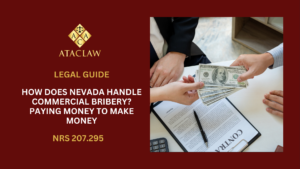In Nevada’s competitive business environment, maintaining integrity within commercial transactions is paramount. However, situations arise where ethical lines can be blurred, leading to unlawful activities such as commercial bribery. ATAC LAW takes a closer look at Nevada’s stance on this complicated issue, aiming to enlighten individuals and corporations alike on the legal boundaries set by the state.
Commercial bribery occurs when an employee or an affiliate of a company is influenced by an external party—through money or other benefits—to make a business decision without the knowledge or approval of their superior or employer. This act compromises the core values of trust and loyalty within a professional setting, leading Nevada to classify it as a misdemeanor offense.

How Does Nevada Tackle the Issue of Commercial Bribery?
In the realm of business, the trust between an employee and their employer is paramount. However, this bond is sometimes jeopardized by the act of commercial bribery—a scenario where employees or representatives of a company are swayed by external incentives, like financial compensation, to influence the firm’s business decisions unwarrantedly.
- Take this scenario as an illustration: Imagine a staff member at a car review magazine, let’s call him John, who’s approached by an auto manufacturer. They offer John a considerable sum, say $10,000, to endorse their sedans as the top family vehicles of the year. This situation typifies commercial bribery, making the auto manufacturer culpable for initiating the offer, and John equally accountable if he decides to accept it.
In Nevada, the law perceives commercial bribery as a breach of the fundamental ethical duty an employee owes to their employer—a commitment to act in the company’s best interests without compromise. Legal actions can be pursued against both the external party offering the bribe and the internal personnel contemplating on accepting or soliciting such bribes.
It’s crucial to distinguish commercial bribery from extortion, as outlined in NRS 205.320. Extortion is considered a more egregious offense due in part to its coercive element—threatening harm to secure a favor, thus carrying heftier legal repercussions.
The principle underlying Nevada’s stance on commercial bribery is clear: it seeks to preserve the integrity of business operations by ensuring decisions are made free of undue external influences. For businesses and individuals navigating the complexities of commercial interactions, understanding the fine line between lawful persuasion and unlawful bribery is essential.
Could You Face Jail Time for Commercial Bribery?
Yes, engaging in commercial bribery can indeed lead to jail time. Classified as a misdemeanor within the legal framework, individuals found guilty of commercial bribery may be sentenced to up to six months in jail. Additionally, they could be fined up to $1,000. However, the ramifications of such a conviction extend far beyond immediate legal penalties.
Being convicted of commercial bribery can profoundly impact your professional future. Such a mark on your record might deter potential employers, significantly narrowing your career opportunities. It’s crucial for anyone facing charges or tempted by the prospect of engaging in commercial bribery to comprehend the full scope of these consequences.
What Are Other Types of Bribery Crimes in Nevada?
Apart from commercial bribery, which is considered the least severe bribery offense in Nevada, there are several other forms of bribery that carry legal consequences. To learn more about these specific offenses, click on the relevant links below:
- Bribery of/by Witnesses
- Sports Bribery
- Bribery of/by Public Officials
- Bribery of/by Judges or Jurors
What Defenses Can You Use Against Charges of Commercial Bribery in Nevada?
Facing charges under NRS 207.295, commonly associated with commercial bribery, can be a daunting experience. However, not all is lost if you find yourself in such a predicament. At ATAC LAW, having stood by the side of countless individuals charged with white-collar crimes, including commercial bribery, we’ve seen firsthand how certain defenses can significantly sway the outcome in favor of our clients.
- Firstly, a lack of intent to commit bribery can be a robust defense. If evidence suggests that any payments or benefits exchanged were not intended as bribes—for instance, you believed the payment was for a legitimate, unrelated company expense—this can be a compelling argument for your innocence.
- Another effective defense hinges on consent from a company authority. If you can prove that your actions were carried out with the explicit approval or authorization of a company executive or someone in a significant decision-making position, then the actions may not be classified as commercial bribery. Consent effectively negates the illicit nature of the transaction.
- Lastly, false accusations must be considered. In some situations, individuals might find themselves wrongfully accused due to reasons ranging from simplistic misunderstandings to malice-fueled revenge. Demonstrating the baselessness of such accusations can effectively counter the charges.
At ATAC LAW, we specialize in navigating the complexities of defending against commercial bribery charges. Our expert team is adept at uncovering and leveraging these defenses, among others, to protect our clients’ rights and reputations. If you’re facing allegations of commercial bribery, it’s crucial to consult with legal experts who can assess your situation, identify applicable defenses, and craft a strategy aimed at achieving the best possible outcome.
For further legal assistance and to discuss your case with an expert, don’t hesitate to contact ATAC LAW.
